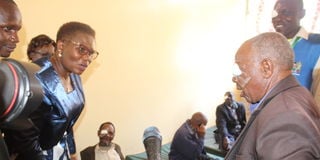Premium
Sh300 million boost for eye care in Meru

Meru Governor Kawira Mwangaza (L) talks to patients who had undergone eye surgery at Ruiri Health Centre on World Sight Day.
Several development partners have pledged to spend more than Sh300 million in eye health care in Meru in the next four years.
This is as it emerged that more than 270,000 Meru residents have some form of eyesight problem, while 8,000 are blind.
The initiative by Christian Blind Mission (CBM) International, AIC Health Ministries, Kenya Society for the Blind, PEEK, Spark and the Fred Hollows Foundation is called the Vision Impact Project.
Under the programme, the Meru County government has received equipment worth more than Sh30 million to equip the eye care unit at Meru Teaching and Referral Hospital.
Meru acting Health Chief Officer Joseph Wahome said the initiative will enhance the county’s capacity in diagnosis, treatment and corrective surgery, as well as providing spectacles at subsidised rates.
“Already, close to 500 people have undergone eye surgery in the last three weeks. We now have an optical shop at Meru Teaching and Referral Hospital. Several nurses and clinical officers are being trained on ophthalmology to improve access to eye care,” Dr Wahome said.
The county will have about 12 hospital eye units fully equipped in the next four years to reach more residents.
Speaking during World Sight Day celebrations in Meru, Dr Michael Gichangi, the head of ophthalmology at the Ministry of Health, said conditions like trachoma and cataracts, which lead to blindness, can be cured while other eye conditions can be managed.
“The biggest challenge has been the availability of an ophthalmology workforce. Meru has a shortage of six ophthalmologists. Many more health workers are needed in this area,” Dr Gichangi said.
“As a ministry, we will support capacity building and recruitment of more specialists because demand for eye care is expected to rise.”
He urged Kenyans to get regular eye checkups so that timely interventions can be made.
Mr Solomon Bukhala, from the Kenya Society for the Blind, said 11 community rehab assistants were deployed to the county to identify and refer patients for treatment or assessment.
Jane Ouma, the Fred Hollows Foundation county director, said Kenya needs to address the cost of eye health care.
“Currently, many Kenyans cannot afford eye health care. There is a need to mainstream eye care in the health policies and integrate it into universal health care. This will reduce out-of-pocket expenditure,” Ms Ouma said.
CBM International programme manager Kevin Sudi said the project would involve enhancing access to water and sanitation, which have a bearing on eye health.
“We also want to ensure there is an efficient referral system for eye care,” Mr Sudi said.
Meru is among nine counties benefiting from the Vision Impact Project due to its high number of cases of trachoma and cataracts.




